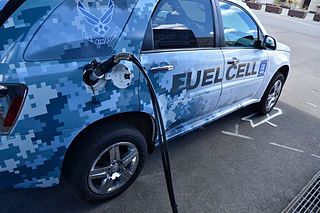Unfortunately, We’ll Be Hearing Plenty More about Hydrogen Fuel-cell Vehicles
Every day, it seems we read more about hydrogen fuel-cell vehicles, most of which appear to be written purely to further confuse people who don’t really understand this in the first place. An excerpt from the article linked above: “Fuel-cell vehicles …. can operate on renewable hydrogen gas.” As the author must know, the concept of “renewable hydrogen gas” has no meaning at all.
Insofar as hydrogen exists only in trace amounts in the Earth’s atmosphere, it needs to be created by zapping water with electricity, splitting apart the oxygen and the hydrogen. Some of this energy is then collected when the two elements are re-introduced. The questions then become:
• What are the costs and efficiencies of this process? (The answers aren’t encouraging.) And more to the point,
• Where did the electricity necessary to drive this process come from in the first place? (Obviously, if it came from solar, wind, etc., that’s better than if it came from coal.)
• Add in the concept of retrofitting 230 million cars and trucks (in the U.S. alone – over one billion worldwide) with fuel-cells.
• Then consider the cost of building a brand new fuel-delivery infrastructure that serves the U.S., whose land-mass is 3.5 million square miles in the “lower 48,” in an era where we’re having trouble affording education, healthcare, and the repair of roads and bridges.
It’s preposterous. But don’t count on this asinine discussion going away, in favor of one that could possibly make a difference.
I don’t pretend to understand the forces that lie behind all this media attention, but I do know this: they have nothing whatsoever to do with a transition to sane and eco-friendly transportation.


I believe you are misreading the linked article. The sentence “[Fuel cell vehicles] can operate on renewable hydrogen gas” is the exact analog of a sentence I’m sure you will agree with, “Electric vehicles can operate on renewable electricity.” That is not to say that all hydrogen (or all electricity) is renewable: If hydrogen is made from renewable sources, then it’s renewable hydrogen. (Renewable hydrogen could come from renewable biomass, renewable biogas, or renewable electricity, or even be directly catalyzed by sunlight.)
That said, I agree that the questions you propose are the right ones, and they should also be asked about the electricity for charging EVs.
I agree that the inefficiencies of creating hydrogen by electrolysis currently make FCVs a bad solution to our transportation needs, but there is no physical reason that the efficiency of electrolysis or other hydrogen pathways may not be improved.
I hate to admit it, but you have a point here.
I recall a time when I was explaining to an employee that a client who was mad at our company “had a point.” My assistant who had overheard my end of the conversation popped her head in my office and asked rhetorically, “Doesn’t it suck when they have a point?” 🙂
What did you think of my post on Spinoza, btw?